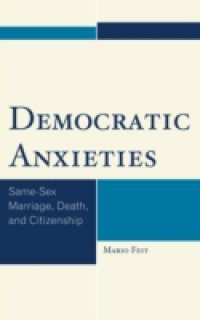Democratic Anxieties: Same-Sex Marriage, Death, and Citizenship proceeds from the surprising parallels between straight and gay opponents of same-sex marriage. With their apocalyptic rhetoric they inadvertently point to a frequently neglected, existential dimension of democratic citizenship. Democratic Anxieties argues that we must pay attention to the existential significance of democratic citizenship, because otherwise we end up with anxious democracy-a democracy that cannot fully embrace pluralism, especially when the connections between sex, death, and citizenship are at stake. This book pursues a less anxious conception of democratic citizenship in chapters on Jean-Jacques Rousseau, Hannah Arendt, and Friedrich Nietzsche. Feit reveals how Rousseau diminishes democratic citizenship by linking it to existential consolation via sexual reproduction. He interprets Arendt as a queer theorist, because she rejects the heteronormative pursuit of reproductive immortality. Yet, the hope for immortality persists within Arendt's conception of political action, which delimits its democratic potential. Feit argues that Nietzsche resists both Rousseau's political idealization of heterosexuality and Arendt's anxious alternative. Calling for an affirmation of death, Nietzsche, creatively reimagines sexual as well as cultural reproduction, that is, pluralizes democratic citizenship. The resulting, more existentially aware democratic politics not only contributes to lesbian and gay equality, but is also critical in a post-September 11 world.

